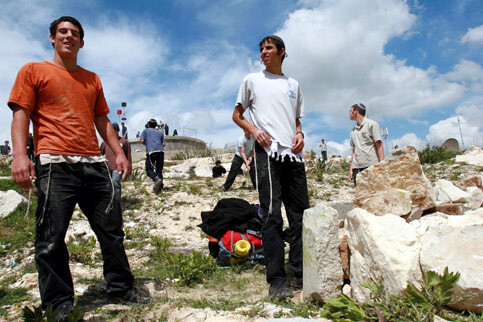The Electronic Intifada 13 November 2007

Israeli settlers numbering around 450,000 in the West Bank and East Jerusalem make the “one-state solution” more of a “one-state reality.” (Anat Zakai/MaanImages)
A few weeks ago, the Oxford University Union held a debate on the “one-state solution” in Palestine/Israel. Before the speakers had even taken to the floor, however, the event was the focus of an intense controversy, over allegations that the Union organizers had buckled under pressure to cancel Norman Finkelstein’s appearance. Ghada Karmi, Ilan Pappe, and Avi Shlaim — all scheduled to speak on the opposite side of the floor to Finkelstein — pulled out in solidarity. [1]
Though concerning, the hullabaloo risked overshadowing what was at the core of the tabled motion — a much-needed discussion about the best way forward for Palestine/Israel. While private initiatives offering “creative” solutions come and go, from all ends of the political spectrum, their “innovation” is typically restricted to how elaborately they can sugarcoat Israeli land theft or how best to dress up a refusal to implement core Palestinian rights. [2]
The real paradigmatic shift is not to be found in talking about the “two-state versus one-state” solution or anything else in between, because this debate misses the point. It’s not a question of proposing a “one-state solution,” but of recognizing the “one-state reality.” This has been brought about by Israel’s integration of East Jerusalem and the West Bank into the infrastructure and legal fabric of the Jewish state since 1967, to the extent that there is de facto, if not de jure, annexation.
This is plainly observable on the ground when, for example, one drives from Tel Aviv to the Gush Etzion settlement bloc with no discernible shift in territorial sovereignty. The road networks intersecting the West Bank are just one part of the territorial homogeneity from the Jordan River to the Mediterranean. The same aquifers provide water for both Palestinians and Israelis, albeit currently on a discriminatory basis enforced by Israel. From border “security buffer zones” to settlements, the occupied territories have been carved up and colonized, absorbed physically and bureaucratically.
Even more tellingly, in the areas of confiscated Palestinian land in the West Bank — what Israeli architect Eyal Weizman has called “a non-contiguous archipelago of thousands of separate ‘islands’ ” — it is Israeli law that is applied. [3] These “state lands” are created so that the settlers living in the colonies can enjoy the normal rights afforded to (Jewish) Israeli citizens.
Strangely, although cruder Israeli propaganda has always claimed that there is in fact no occupation but merely “administration,” the language and context of occupation has in some ways assisted Israeli colonization of “the territories.” Occupation, by implying a temporary state of affairs, has been used to lend an air of legitimacy to certain “security” measures (even settlement construction) despite their intended permanency.
The two most common critiques of a one-state solution are that it is a recipe for massive bloodshed and that it is impossible to implement. Either or both positions are taken not just by frothing Zionist apologists like Alan Dershowitz but also by well-intentioned observers. Announcing the “death” of the Oxford Union, Dershowitz claimed that the “so-called one-state solution is simply a way of achieving by demography what the Arab world has failed to achieve by military attacks.” [4] “Demography” is the polite word for “people.” With rhetoric that any self-respecting racial supremacist would be proud of, the Palestinians are individually and collectively categorised as a threat.
Moreover, it is grossly disingenuous to apocalyptically predict a future one-state solution as guaranteeing a bloodbath or “anti-Jew genocide.” There already is “one state” and the remaining question, and real debate, is over its character. Will different laws and rights continue to be afforded to people on the basis of their ethnicity? Will it be an exclusivist, apartheid state — or a democracy where Jews are no more privileged than Palestinians?
Far from being an idealistic fantasy, the practicalities for a single state are continuously detailed and debated by specialists in their fields. This weekend (17-18 November) SOAS will host a conference in London organized by the One State Group called Challenging the Boundaries. Panels of academics and activists will “attempt to unpack” concepts like bi-nationalism, federalism, multiculturalism in order to “contribute to the long process of engineering a new political landscape that would not rely on imposed exclusivism of any type.” [5]
Those scheduled to appear at the conference include professors of history, geography, development and political science. Many, such as Ilan Pappe, Joseph Massad, Nur Masalha, Tikva Honig-Parnass, Ali Abunimah and Ghada Karmi, have already written on the ethical imperative and the practical feasibility of the one-state model. Other widely available books include Joel Kovel’s Overcoming Zionism, Jamil Hilal’s Where Now for Palestine? and Virginia Tilley’s The One-State Solution.
To say that the “one-state solution” is impractical or equals the “destruction” of Israel is poorly concealed code for defending the indefensible and a recipe for continual conflict in a land it is impossible to partition. It is to maintain, against the odds, the Zionist fiction that Palestine was a land without a people for a people without a land. It is to entertain the fantasy that the occupied territories so comprehensively colonized by Israel can become a “Palestinian state” which isn’t apartheid in name only.
Ben White is a freelance journalist specializing in Palestine/Israel. His website is at www.benwhite.org.uk and he can be contacted directly at ben@benwhite.org.uk.
Endnotes
[1] See Ghada Karmi’s piece on Comment is Free and the following post on Jews Sans Frontieres for some of the allegations and counter-allegations that were put forward.
(http://commentisfree.guardian.co.uk/
ghada_karmi/2007/10/intellectual_terrorism.html, http://jewssansfrontieres.blogspot.com/
2007/10/to-conclude-was-it-ex-orangeman-or.html).
[2] Israeli MK Benny Elon’s “Right Road to Peace” and Mexican-born American businessman Daniel Lubetzky’s “OneVoice Movement” are two such examples.
(http://www.therightroadtopeace.com/eng/defaulteng.html,
http://www.onevoicemovement.org/wps/portal/).
[3] Eyal Weizman, Hollow Land: Israel’s Architecture of Occupation (Verso 2007), p.121.
4 [4] Alan M. Dershowitz, “Oxford Union is Dead,” Front Page Magazine http://www.frontpagemag.com/Articles/
Read.aspx?GUID=dac7c4be-09ac-4d96-abe1-6fea35ad4be3).
[5] http://www.onestate.net/programme.htm





